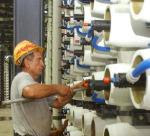
Karin Kloosterman
September 15, 2009
Israel 21c
Israel is home to the largest seawater desalination plant in the world, at Ashdod (pictured). Now Israeli company Rotec is developing a desalination plant for inland brakish water. Photo by Edi Israel, Flash90.
A new Israeli technology for desalination is the centrepiece of a NATO grant that promotes collaboration between Israel and Jordan and could save water and energy across the globe. srael and Jordan share environmental problems, but regional politics and prejudices keep them from solving them together. A new North Atlantic Treaty Organization (NATO) grant set up to develop two inland water desalination plants - one in Israel and one in Jordan - not only gets two Middle East universities collaborating, but the end-product could quench the region's thirst. It could also boost an under-used new technology that promises to save energy and water the world over.
According to the terms of the project, three universities - Ben Gurion University in Beersheba, the Hashemite University of Jordan and the University of Colorado in the United States - are to implement a new Israeli reverse osmosis desalination technology at two pilot sites.
Developed originally at Ben Gurion University by Dr. Jack Gilron of the Zuckerberg Institute for Water Research and Prof. Eli Korin of the department of chemical engineering, a new six-person company called Rotec is commercializing the research and turning it into a product.
The universities, as partners, will implement the new reverse osmosis Rotec technology at an existing water plant near Eilat run by Mekorot, Israel's national water carrier. A second pilot site north of Amman in Al Zareqa could become a new water plant if the pilot goes well.
Desalination technology is famously known for squeezing drinking water from the sea, but Rotec's new desalination technology works inland to clean the salts from brackish water located in aquifers deep underground. Although far from the sea, these areas can also contain high concentrates of salts, which need to be removed to make water drinkable.
Cost-saving, scalable technology
While pilot sites in Israel and Jordan will be set up to produce a small amount of water, about 120 cubic meters a day, the technology is easily scalable, with the pilot meant to be a proof of concept in the field, Noam Perlmuter, Rotec's CEO, tells ISRAEL21c.
Rotec was formed as a company this year and the scalable, retrofit technology will get its pilot run at Israeli and Jordanian sites, by the end of this year, and the beginning of 2010 respectively. In the meantime, Perlmuter is seeking US and foreign strategic partners to set up the technology elsewhere, in areas like the Midwestern United States, India and Australia, where drinking water is scarce but inland aquifers could provide water.
"The most important thing is not only the additional clean water you are getting," says Perlmuter. "The biggest advantage to the technology is you are increasing recovery, and reducing brine intended for disposal, by 50 percent."
Since it costs up to $2 per cubic meter to dispose of the brine, the savings are significant. "I believe that there are other technologies out there, but am not sure if they are in the commercialization stage," Perlmuter tells ISRAEL21c. At least, "none are working using flow-reversal," notes the 38-year-old.
Rotec will benefit indirectly from the international grant, awarded through the NATO Science for Peace program and the Middle East Desalination Research Center (MEDRC). The company has already attracted considerable interest and seed funding through Israel's Office of the Chief Scientist, Israel's national water carrier, Mekorot and a smaller Israeli-based venture capital firm BDB. Perlmuter did not wish to disclose financials.
A briny solution for peace
Based in the Ashkelon Technology Incubator (ATI), Rotec's technology is ready for commercialization, says Perlmuter, stressing that it's an attractive solution wherever brackish water and brine removal are a problem.
Developed by the Israeli scientists, the Rotec clean technology solution exploits a physical process on the surface of the desalination membrane before it can be fouled. Gilron says that "the process will be tuned to reduce brine volumes to 33%-50% of those generated in conventional reverse osmosis. This greatly reduces the environmental burden and improves the economics of the inland desalination process.
"Water scarcity and the need to develop new water resources for populations not on the seacoasts are driving efforts to desalinate brackish water and municipal wastewater with ever-increasing efficiencies," he notes.
The technology is out-licensed by BGN Technologies, the university's technology transfer company and ATI. The university inventors and Perlmuter, as well, are quite proud of NATO's interest in the project, which has a number of positive parameters for the environment and for promoting Middle East peace.
Perlmuter tells ISRAEL21c: "NATO normally wants to establish peace. And as you know water is a source of a lot of problems in the Middle East."
An add on to existing plants
NATO promotes peace, he explains, "by investing in and funding a novel technology to improve desalination processes, to get more water, to produce less brine for disposal and less chemicals against anti-scalants."
An advantage of the technology is that it upscales in a linear fashion, and can be added on to existing water treatment plants. "This is the first time you can use the same plant you normally use, and just change the way you are operating it," says Perlmuter. "You will achieve a higher recovery rate - if the normal water recovery is 70-85%, we are talking about more than 90%."
Let's hope that the same technology will increase the chances that long-lasting peace in the region will finally be achieved - up to 100%.
http://www.israel21c.org/index.php?option=com_content&view=article&id=7181:nato-aids-water-bridge-between-israel-jordan-and-the-us&catid=58:environment&Itemid=101
No comments:
Post a Comment